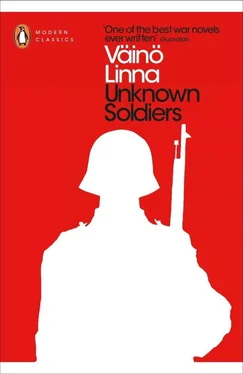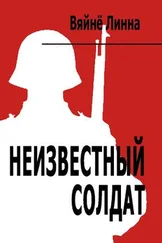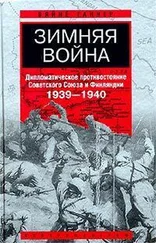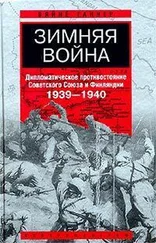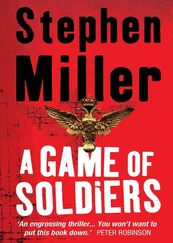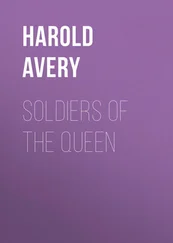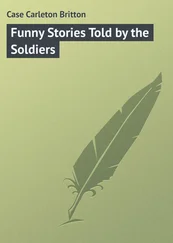‘Damned if I’m going to sort ’em out.’ Lehto laughed his cutting laugh, the same laugh that had always evoked a certain revulsion in them.
‘You shot him in the back. He didn’t try to run anywhere.’ Hietanen seemed pretty worked up. The desperate scream had upset him, and because experiences immediately cut to the quick with him, more so than with any of the others, the prisoner’s pleading smile had already managed to stir up his sympathy. The man really was a human being to him, not just some creature that had been regarded as a concept so it could be killed without any pangs of conscience.
Lehto flew into a rage. ‘From the back!’ he snarled viciously. ‘Better that than from the front. Ends quicker that way. Go on, why don’t you snivel over the bastard, for fuck’s sake. Read him “Our Father”.’
Riitaoja turned away, trembling. He couldn’t look at the body, which had two bullet holes between the shoulders. Hietanen turned his back to Lehto, and said, ‘Shoot, shoot, for all I care. I’m not the court martial. But that man had been damn well scared enough.’
‘Yeah, but that don’t mean we gotta whimper over him,’ Salo said, with contrived machismo.
‘What’s all the fuss about, then?’ Lahtinen asked, looking rather contemptuously at the lot of them. ‘One man pulls the trigger over there, a grenade lands on somebody else dozens of miles away, and there’s nothing you can do about any of it. But we’re gentlemen, huh? We don’t shoot guys who aren’t armed. Ha! Those bourgeois officers are just trying to put some kind of noble seal on killing. War is senseless enough all by itself without us adding all kinds of rules about courtesy and politeness.’
‘OK, OK. Let’s head back.’ For the first time, they detected a note of irritation in Koskela’s voice. His gait was a bit stiffer than usual, too. Some of them figured it was Lehto who had irritated him, and others assumed it was Lahtinen, but in truth it was all of them. The event and its aftermath had stirred up feelings in Koskela he thought he had buried beneath the snowdrifts of the Winter War. He had tried to forget about death – his own or anybody else’s – and to maintain a certain tranquility. This tranquility was dear to him, and he was angry now that it had been upset. Nothing had been quite brutal enough to desensitize him to the insanity of war. He fought, and he fought better than countless others, but each despicable deed and show of pride in killing awakened the judge in him. He had tried to fulfill his duty, blocking out its insanity, and now this equilibrium had been upset – which was why he was walking jerkily several yards in front of his men. But soon his heaving breath evened out. He calmed down. The lingering shock of the experience fell away and Koskela was his former self once more. The baseness of what Lehto had done had affected him most deeply of all of them, probably – but after a few minutes, it ceased to trouble him. And so, one more incident receded into the past. Nobody learned anything from it, and everybody, by forgetting, condoned it.
Their spirits remained low for quite a while, however. Lehto was sullen and quick to glare back defiantly at anybody who happened to catch his eye. He set off to relieve the guys on guard duty, their shift having gone over-time because of the disturbance. An occasional bullet would emerge from the forest here and there, but Lehto stayed standing behind the machine gun, smoking his mahorka in long, furious drags. Kariluoto ordered him to take cover, but Lehto just flashed him a contemptuous, thin-lipped sneer.
Rahikainen returned from guard duty with Sihvonen. ‘You boys ate your emergency rations while we were on guard!’
‘Well, why don’t eat yours too?’
‘Oh, I already ate ’em back on the other side of the border.’
‘Shoulda guessed.’
‘Well, why didn’t you guess, then? You boys shot that Russki.’
‘Wasn’t the first.’
‘Oh, I’m not keepin’ count. Just makin’ small talk with ya.’
‘You should have seen how scared that guy was,’ Hietanen insisted. In his mind, the prisoner’s fear had established the degree of humanity with which he should have been treated. The amount of pity they owed him was determined by the amount of fear he demonstrated, in other words. A natural response from a child of nature.
‘They’re afraid we’ll shoot ’em if they give themselves up,’ Salo explained.
‘Well, you shot him, didn’t you? The guy wasn’t scared for nothin’!’ Rahikainen shouted over in passing, digging his sugar out of his gas mask. ‘You boys are all out of sugar, aren’tcha? I rigged up a storage method to keep mine dry.’
Salo’s comment had set some of the others laughing as its comedy dawned on them. Salo’s simple-mindedness wasn’t news to anybody, of course, as it was clear that he, more than any of them, had swallowed the national curriculum hook, line and sinker. This instance struck them as particularly amusing, though. Even Salo perceived it, and started protesting defensively, ‘Well, it’s not like we poke their eyes out and chop their tongues off! And Lehto said he tried to make a break for it. When that happens, you’re allowed to shoot. The Code of Military Justice gives you permission.’
The duty guard walked by shouting, ‘The infantry is moving out! Get ready to head out!’
‘Whistles in your pockets!’ Koskela said as he headed into position. And so the men followed suit, leaving their new impressions to pile up on top of the old, with one more inoculation against humanity down.
III
The rain clouds dispersed into ever fainter strands. The gray morning gave way to radiance as sunlight pierced through the clouds. Droplets glistened in the wet forest, and even if the grass drenched the men’s trousers up to the knee, it was still nice to walk. Their damp clothing began to dry in the warmth of the sun, and the crisp summer morning washed away the heavy mood of the rainy night.
Stray shots rang out now and again, and then an engine rumbled somewhere out in front of them.
‘We’re coming to a road, guys.’
‘ Rookee veer, idzii surdaa ! Come out!’
A man emerged from the bushes, a white rag in his hand. Others followed behind him – about twenty men in all. They belonged to the same wandering, lost detachment as the men Määttä had seen and as the prisoner Lehto had shot. Nobody really knew what was going on, but the men understood that something decisive must have taken place if these prisoners were surrendering. The enemy was scattered, and the artillery fire had moved during the night and now seemed to be firing from somewhere far out in front of them.
Then they spotted the main road. They approached it with caution, but quickly confirmed that it presented no danger. The morning sun had already dried out the road’s surface, which had been torn up by tank treads. They had barely made it to the road when a fleet of cyclists appeared, on their way from the border.
‘Unit?’
‘Jaeger Battalion. Neighbors far off?’
‘Got about twenty of them in the bushes over there.’
‘Don’t get smart with me. Where’s your company commander?’
The helmeted Jaeger lieutenant stepped off his bicycle. He was an extremely militaristic-looking fellow, in his helmet and rolled-up shirt sleeves, with his submachine gun slung around his neck. His men were just the same. They evidently imagined themselves to be some sort of elite unit, and they clearly did not belong to the tattered ranks of the infantry.
Kariluoto hurried over. Eagerly, he greeted the visiting officer, ‘How do you do? Where are you gentlemen headed?’
‘Lake Onega. Next stop’s Loimola. Are you the company commander? I was told I would find units from your regiment here and was ordered to make contact.’
Читать дальше
